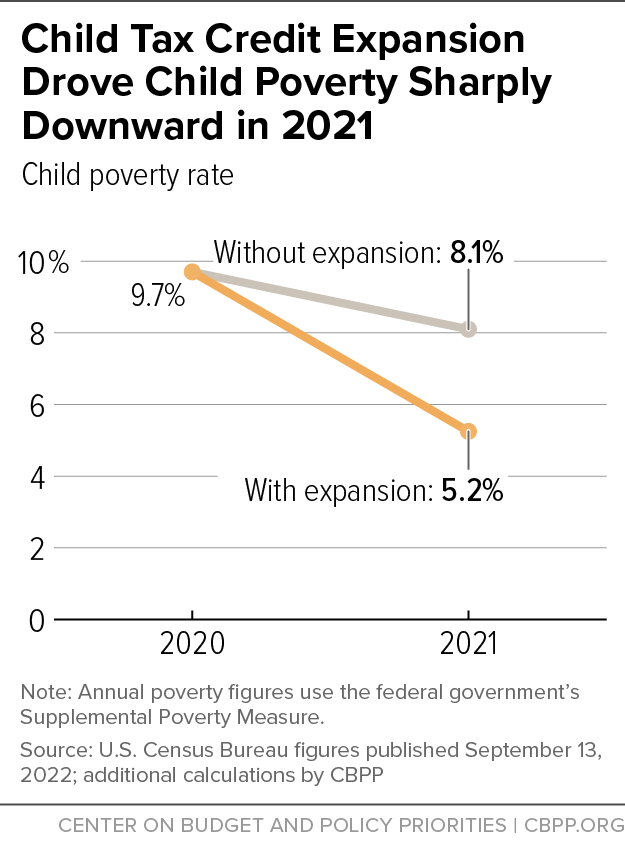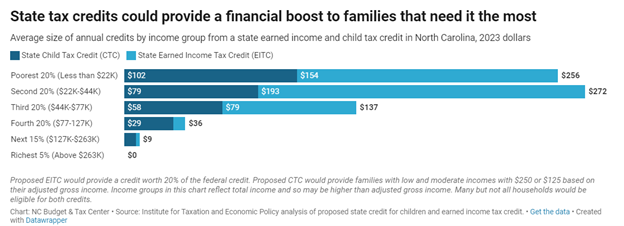Back in March of 2021, as part of the American Rescue Plan, Congress expanded an important tax benefit: The Federal Child Tax Credit. The credit, originally enacted as part of the Taxpayer Relief Act of 1997, was increased from $2,000 to $3,000 per child ages 6-17, and to $3,600 per child below the age of 6. The bill also made an important change to the credit, making it fully refundable. Even if parents owed less in taxes than the credit covered, they could still receive the full refund.
The effects were remarkable.
By the end of December 2021, the credit’s expansion had kept 3.7 million children out of poverty. According to the Census Bureau, child poverty had fallen to its lowest level on record at the end of 2021: 5.2%. Since 70% of all children in poverty in the United States are children of color, poverty rates for Black and Hispanic children fell at the highest rates during the credit’s expansion. Unfortunately, December 2021 was the final month families received the increased benefit, and Congress declined to renew the expanded benefits.

Today, the Federal Child Tax Credit is once again $2,000 per qualifying child and is not fully refundable. Amidst this reduction, factors like inflation and the ballooning costs of childcare have families struggling to get by. We see this impact here every day as we meet hardworking parents doing their best to put food on the table, ensure a roof over their children’s heads, and keep the lights on.
Through no fault of their own, these families have been thrown into financial situations that exceed their monetary means. They turn to the community for help through Crisis Assistance Ministry. A fully refundable child tax credit would make a world of difference for them. Unfortunately, that relief doesn’t seem likely to come from the federal level. However, the state of North Carolina could make it happen.
The wide-ranging body of research on the expanded Child Tax Credit shows how effective the policy is as an antipoverty measure. Research also shows how it can positively impact racial equity. Consequently, several states have enacted their own state-level Child Tax Credits. Currently, twelve states have Child Tax Credits enacted, with nine of them being fully refundable. North Carolina is not currently one of them. However, our state has both the potential and the need to enact such a benefit.
Analysis from the North Carolina Budget & Tax Center shows the positive impact a state-level Child Tax Credit could have. The benefit would target those most in need, with 97% of the total benefits allocated going to the bottom 80% of income earners in the state. In fact, the poorest 20% of income earners would benefit the most from the credit. With nearly half of North Carolina’s children living in poor or low-income families, the credit would provide a much-needed boon for parents struggling to provide for their children.
At Crisis Assistance Ministry, it is our vision “to inspire our community to justice and generosity as we provide help, hope, and understanding to people struggling with limited financial resources.” We believe everyone should have the opportunity to reach their full potential. Children growing up in low-income families are among our state’s most vulnerable residents. They deserve public policy that supports their well-being. A fully refundable child tax credit is one way North Carolina can send a clear message that it values all children and every family, regardless of income level.
The mission of Crisis Assistance Ministry is to provide assistance and advocacy for people in financial crisis, helping them move toward self-sufficiency. Our vision is to inspire our community to justice and generosity as we provide help, hope, and understanding to people struggling with limited financial resources. Civic engagement initiatives fulfill our goal of advocating for people in financial crisis while inspiring our community to justice and understanding for people with limited financial resources.

